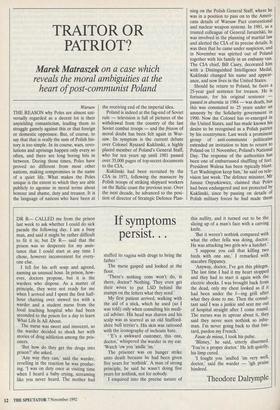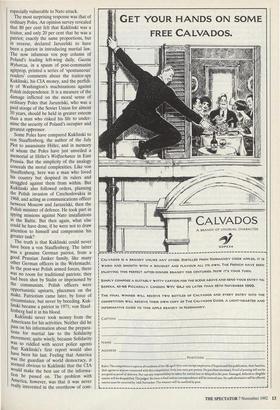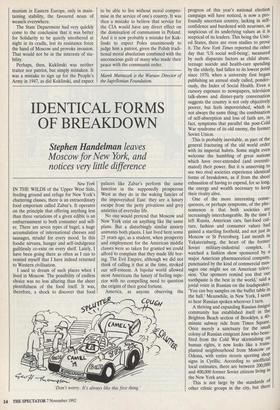TRAITOR OR PATRIOT?
Marek Matraszek on a case which
reveals the moral ambiguities at the heart of post-communist Poland
the receiving end of the imperial idea.
Poland is indeed at the fag-end of Soviet rule — television is full of pictures of the withdrawal from the country of the last Soviet combat troops — and the frisson of moral doubt has been felt again in War- saw. Its symptom is the current debate over Colonel Ryszard Kuklinski, a highly placed member of Poland's General Staff, who for ten years up until 1981 passed over 35,000 pages of top-secret documents to the CIA.
Kuklinski had been recruited by the CIA in 1971, following the massacre by Polish troops of striking shipyard workers on the Baltic coast the previous year. Over the next decade, he advanced to the posi- tion of director of Strategic Defence Plan-
ning on the Polish General Staff, where he was in a position to pass on to the Ameri- cans details of Warsaw Pact conventional and nuclear weapon systems. In 1981, as a trusted colleague of General Jaruzelski, he was involved in the planning of martial law and alerted the CIA of its precise details. It was then that he came under suspicion, and in November was spirited out of Poland together with his family in an embassy van. The CIA chief, Bill Casey, decorated him with a Distinguished Intelligence Medal, Kuklinski changed his name and appear- ance, and now lives in the United States.
Should he return to Poland, he faces a 25-year gaol sentence for treason. He is fortunate, for his original sentence — passed in absentia in 1984 — was death, but this was commuted to 25 years under an amnesty by the Solidarity government in 1990. Now the Colonel has re-emerged in the United States, and has made known his desire to be recognised as a Polish patriot by his countrymen. Last week a prominent group of anti-communist politicains extended an invitation to him to return to Poland on 11 November, Poland's National Day. The response of the authorities has been one of embarrassed shuffling of feet. President Walesa has been typically blunt. 'Let Washington keep him,' he said on tele- vision last week. The defence minister, Mr Janusz Onyszkiewicz, claimed that Poles had been endangered and not protected by Kuklinski, since by passing on details of Polish military forces he had made them
especially vulnerable to Nato attack.
The most surprising response was that of ordinary Poles. An opinion survey revealed that 80 per cent felt that Kuklinski was a traitor, and only 20 per cent that he was a patriot; exactly the same proportions, but in reverse, declared Jaruzelski to have been a patriot in introducing martial law. The now infamous vox pop column of Poland's leading left-wing daily, Gazeta Wyborcza, in a spasm of post-communist agitprop, printed a series of 'spontaneous' readers' comments about the traitor-spy Kuklinski, his CIA money, and the perfidi- ty of Washington's machinations against Polish independence. It is a measure of the damage inflicted on the moral sense of ordinary Poles that Jaruzelski, who was a paid stooge of the Soviet Union for almost 50 years, should be held in greater esteem than a man who risked his life to under- mine the security of Poland's occupier and greatest oppressor.
Some Poles have compared Kuklinski to von Stauffenberg, the author of the July Plot to assassinate Hitler, and in memory of whom the Poles have just unveiled a memorial at Hitler's Wolfsschanze in East Prussia. But the simplicity of the analogy conceals the moral complexities. Like von Stauffenberg, here was a man who loved his country but despised its rulers and struggled against them from within. But Kuklinski also followed orders, planning the Polish invasion of Czechoslovakia in 1968, and acting as communications officer between Moscow and Jaruzelski, then the Polish minister of defence. He took part in Tying missions against Nato installations in the Baltic. But then again, what else could he have done, if he were not to draw attention to himself and compromise his greater task?
The truth is that Kuklinski could never have been a von Stauffenberg. The latter vvas a genuine German patriot, from a good Prussian Junker family, like many Other German officers in the Wehrmacht. In the post-war Polish armed forces, there was no room for traditional patriots: they had been shot by Stalin or imprisoned by the communists. Polish officers were oPportunistic upstarts, placemen on the make. Patriotism came later, by force of circumstance, but never by breeding. Kuk- linski became a patriot in 1971; von Stauf- fenberg had it in his blood.
Kuklinski never took money from the Americans for his activities. Neither did he Pass on his information about the prepara- tions for martial law to the Solidarity movement; quite wisely, because Solidarity was so riddled with secret police agents that Kuklinski's first report would also have been his last. Feeling that America was the guardian of world democracy, it seemed obvious to Kuklinski that the CIA would make the best use of the informa- ti°n he passed on. The problem with America, however, was that it was never really interested in the overthrow of com-
munism in Eastern Europe, only in main- taining stability, the favoured noun of weasels everywhere.
The State Department had very quickly come to the conclusion that it was better for Solidarity to be quietly smothered at night in its cradle, lest its resistance force the hand of Moscow and provoke invasion. That would not be in the interests of sta- bility.
Perhaps, then, Kuklinski was neither traitor nor patriot, but simply mistaken. It was a mistake to sign up for the People's Army in 1947, as did Kuklinski, and expect to be able to live without moral compro- mise in the service of one's country. It was then a mistake to believe that service for the CIA would have any direct effect on the domination of communism in Poland. And it is now probably a mistake for Kuk- linski to expect Poles unanimously to judge him a patriot, given the Polish tradi- tional moral absolutism combined with the unconscious guilt of many who made their peace with the communist order.
Marek Matraszek is the Warsaw Director of the Jagiellonian Foundation.












































































 Previous page
Previous page